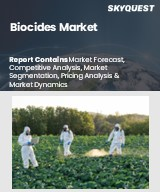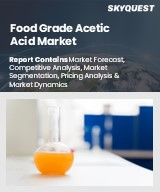
|
시장보고서
상품코드
1563072
방부제 블렌드 시장 : 산업 분석, 규모, 점유율, 성장, 동향 예측(2024-2031년)Preservative Blends Market: Global Industry Analysis, Size, Share, Growth, Trends, and Forecast, 2024-2031 |
||||||
Persistence Market Research는 전 세계 방부제 블렌드 시장에 대한 종합적인 보고서를 발표했습니다. 이 보고서는 시장 성장 촉진요인, 동향, 기회 및 과제를 포함한 중요한 시장 역학을 철저히 평가하고 시장 구조에 대한 자세한 통찰력을 제공합니다.
주요 인사이트
- 방부제 블렌드 시장 규모(2024년) : 2억 2,280만 달러
- 예측 시장 규모(2031년) : 3억 2,630만 달러
- 세계 시장 성장률(CAGR 2024-2031년까지) : 4.3%
방부제 혼합 시장 : 조사 범위
방부제 블렌드는 식품, 화장품 및 의약품을 포함한 다양한 산업에서 제품의 보존 기간을 연장하고 미생물의 성장을 억제하고 안전성을 보장하는 데 필수적입니다. 이러한 블렌드는 특정 규제와 소비자의 취향에 맞게 조정된 천연 보존제와 합성 보존제를 포함한 여러 성분으로 구성되어 있습니다. 방부제 블렌드 시장은 다양한 부문 제조업체를 지원하며 클린 라벨 제품에 대한 소비자 수요에 대응하면서 안전 기준을 준수하는 제형을 제공합니다.
시장 성장 촉진요인:
세계의 방부제 블렌드 시장은 식품의 안전성과 품질에 대한 소비자 의식 증가와 같은 몇 가지 중요한 요인에 의해 추진되고 있습니다. 식중독 발생률 증가와 이에 따른 효과적인 보존 방법에 대한 수요가 시장 확대를 더욱 뒷받침하고 있습니다. 또한, 클린 라벨 제품의 동향 증가는 건강 지향 소비자에게 어필하는 천연과 유기 방부제 블렌드의 배합으로 이어지고 있습니다. 보존 기술과 배합의 기술적 진보는 제품의 효율성을 높이고 시장 성장을 지원합니다.
시장 성장 억제요인:
유망한 성장이 예상되는 방부제 블렌드 시장은 규제 제약, 합성 성분에 대한 소비자의 회의심, 대체 보존 방법과의 경쟁 문제에 직면하고 있습니다. 특정 보존료의 사용에 대한 엄격한 규제 동향은 제조업체의 제품 선택을 좁힐 수 있는 반면, 천연 성분 지향 증가는 합성 보존료 수요 감소로 이어질 수 있습니다. 이러한 규제와 소비자의 과제를 해결하려면 업계 이해 관계자의 끊임없는 혁신과 투명성이 필요합니다.
시장 기회:
방부제 블렌드 시장은 기술 혁신, 인구 동향, 소비자 선호의 진화를 원동력으로 하는 큰 성장 기회를 보여줍니다. 지속가능성과 환경친화적인 관행에 대한 관심 증가는 생분해성과 천연 유래 방부제를 개발하는 방법을 설명합니다. 게다가 전자상거래와 온라인 소매 플랫폼의 확대로 보다 폭넓은 소비자층에 도달할 수 있는 새로운 채널이 개척되어 제품에 대한 액세스가 향상되고 있습니다. 전략적 파트너십, R&D 투자, 새로운 방부제 처방의 채택은 새로운 기회를 활용하고 시장의 리더십을 유지하는 데 필수적입니다.
이 보고서에서 다루는 주요 질문
- 방부제 블렌드 시장의 세계 성장을 가속하는 주요 요인은 무엇인가?
- 어떤 유형의 방부제와 용도가 다양한 산업에서 방부제 블렌드의 채택을 이끌고 있는가?
- 기술의 진보는 방부제 블렌드 시장 경쟁 구도를 어떻게 바꾸고 있는가?
- 방부제 블렌드 시장에 기여하는 주요 기업은 어딘가, 시장 관련성을 유지하기 위해 어떤 전략을 채택하고 있는가?
- 세계의 방부제 블렌드 시장의 새로운 동향과 장래성은?
목차
제1장 주요 요약
제2장 시장 개요
- 시장 분류
- 시장의 정의
제3장 주요 시장 동향
- 시장에 영향을 미치는 주요 동향
- 제품 혁신/개발 동향
제4장 중요 성공 요인
- 구매 결정 분석
- 추천 사항
제5장 세계의 방부제 블렌드 시장 수요 분석
- 과거 시장 규모(톤) 분석, 2019-2023년
- 현재와 장래 시장 수량(톤) 예측, 2024-2031년
- 전년대비 성장 동향 분석
제6장 세계의 방부제 블렌드 시장-가격 분석
제7장 세계의 방부제 블렌드 시장 수요(금액 또는 규모, 100만 달러) 분석
- 과거 시장 매출(100만 달러) 분석, 2019-2023년
- 현재와 장래 시장 매출(100만 달러) 예측, 2024-2031년
- 전년대비 성장 동향 분석
- 절대 수익 기회
제8장 시장 배경
- 거시경제 요인
- 예측요인 - 관련성과 영향
- 밸류체인
- 시장 역학
제9장 세계의 방부제 블렌드 시장 분석(제품 유형별)
- 소개
- 과거 시장 규모(100만 달러)와 제품 유형별 수량 분석, 2019-2023년
- 현재와 장래 시장 규모(100만 달러)와 수량 분석과 제품 유형별 예측, 2024-2031년
- 파라벤
- 알코올
- 포름알데히드 공여체
- 유기산
- 유기산염
- 제품 유형별 시장의 매력 분석
제10장 세계의 방부제 블렌드 시장 분석(용도별)
- 소개/주요 조사 결과
- 과거 시장 규모(100만 달러)와 용도별 수량 분석, 2019-2023년
- 현재와 장래 시장 규모(100만 달러)와 수량 분석과 용도별 예측, 2024-2031년
- 화장품 및 퍼스널케어
- 헤어 케어
- 바디 케어
- 구강 케어
- 식품 및 사료
- 재택치료
- 화장품 및 퍼스널케어
- 용도별 시장의 매력 분석
제11장 지역별 세계의 방부제 시장 분석
- 소개
- 2019-2023년 지역별 시장 규모(100만 달러)와 수량 분석
- 현재 시장 규모(100만 달러)와 지역별 수량 분석과 예측, 2024-2031년
- 북미
- 라틴아메리카
- 유럽
- 중동 및 아프리카
- 동아시아
- 남아시아
- 오세아니아
- 지역별 시장의 매력 분석
제12장 북미의 방부제 블렌드 시장 분석
제13장 라틴아메리카의 방부제 블렌드 시장 분석
제14장 유럽의 방부제 블렌드 시장 분석
제15장 남아시아의 방부제 블렌드 시장 분석
제16장 동아시아의 방부제 블렌드 시장 분석
제17장 오세아니아의 방부제 블렌드 시장 분석
제18장 중동 및 아프리카의 방부제 블렌드 시장 분석
제19장 신흥국의 방부제 블렌드 시장 분석
- 소개
- 주요 국가별 시장 매출 비율 분석
- 세계와 국가별 성장 비교
- 중국의 방부제 블렌드 시장 분석
- 소개
- 가격 분석
- PEST 분석
- 시장 분류에 의한 시장 매출 비율 분석
- 시장 분류별 시장 규모(톤)와 금액(100만 달러)의 분석과 예측
- 제품 유형별
- 용도별
- 인도의 방부제 블렌드 시장 분석
- 소개
- 가격 분석
- PEST 분석
- 시장 분류에 의한 시장 매출 비율 분석
- 시장 분류별 시장 규모(톤)와 금액(100만 달러)의 분석과 예측
- 제품 유형별
- 용도별
제20장 시장 구조 분석
- 기업 Tier별 시장 분석(방부제 블렌드)
- 시장 집중
- 주요 기업의 시장 점유율 분석
제21장 경쟁 분석
- 경쟁 대시보드
- 기업 프로파일
- BASF SE
- DowDuPont Inc.
- Solvay SA
- Clariant AG
- Lanxess AG
- Galaxy Surfactants Ltd.
- Ashland Inc.
- Lonza Group
- Akema Fine Chemicals
- Schulke & Mayr GmbH
- Innospec Inc.
- Seqens Group
- INOLEX Inc
- Thor Personal Care Sas
제22장 사용된 전제조건과 약어
제23장 조사 방법
JHS 24.10.24Persistence Market Research has recently released a comprehensive report on the global Preservative Blends Market. The report offers a thorough assessment of crucial market dynamics, including drivers, trends, opportunities, and challenges, providing detailed insights into the market structure.
Key Insights:
- Preservative Blends Market Size (2024E): USD 222.8 million
- Projected Market Value (2031F): USD 326.3 million
- Global Market Growth Rate (CAGR 2024 to 2031): 4.3%
Preservative Blends Market - Report Scope:
Preservative blends are critical in various industries, including food and beverages, cosmetics, and pharmaceuticals, to extend product shelf life and ensure safety by inhibiting microbial growth. These blends comprise multiple ingredients, including natural and synthetic preservatives, tailored to meet specific regulatory and consumer preferences. The preservative blends market caters to manufacturers across diverse sectors, providing formulations that comply with safety standards while addressing consumer demand for clean-label products.
Market Growth Drivers:
The global preservative blends market is propelled by several key factors, including the rising consumer awareness regarding food safety and quality. The increasing incidence of foodborne illnesses and the consequent demand for effective preservation methods further drive market expansion. Additionally, the growing trend of clean-label products has led to the formulation of natural and organic preservative blends, appealing to health-conscious consumers. Technological advancements in preservation techniques and formulations also enhance product efficacy, supporting market growth.
Market Restraints:
Despite promising growth prospects, the preservative blends market faces challenges related to regulatory constraints, consumer skepticism about synthetic ingredients, and competition from alternative preservation methods. Stringent regulations regarding the use of certain preservatives can limit product options for manufacturers, while the growing trend toward natural ingredients may lead to a decline in demand for synthetic preservatives. Addressing these regulatory and consumer challenges requires continuous innovation and transparency from industry stakeholders.
Market Opportunities:
The preservative blends market presents significant growth opportunities driven by technological innovations, demographic trends, and evolving consumer preferences. The increasing focus on sustainability and eco-friendly practices provides avenues for developing biodegradable and naturally derived preservatives. Furthermore, the expansion of e-commerce and online retail platforms opens new channels for reaching a broader consumer base, enhancing product accessibility. Strategic partnerships, investments in R&D, and the introduction of novel preservative formulations are essential to capitalize on emerging opportunities and sustain market leadership.
Key Questions Answered in the Report:
- What are the primary factors driving the growth of the preservative blends market globally?
- Which types of preservatives and applications are leading the adoption of preservative blends across different industries?
- How are technological advancements reshaping the competitive landscape of the preservative blends market?
- Who are the key players contributing to the preservative blends market, and what strategies are they employing to maintain market relevance?
- What are the emerging trends and future prospects in the global preservative blends market?
Competitive Intelligence and Business Strategy:
Leading players in the global preservative blends market, including BASF SE, DuPont de Nemours, Inc., and Eastman Chemical Company, focus on innovation, product differentiation, and strategic partnerships to gain a competitive edge. These companies invest in R&D to develop advanced preservative solutions, catering to the growing demand for safer, more effective preservation methods. Collaborations with manufacturers across sectors facilitate market access and promote technology adoption. Moreover, emphasis on sustainability and regulatory compliance fosters market growth and enhances consumer trust in preservative blends.
Key Companies Profiled:
- BASF SE
- DuPont de Nemours, Inc.
- Eastman Chemical Company
- Kemin Industries, Inc.
- Syngenta AG
- Chr. Hansen A/S
- Tate & Lyle PLC
- Brenntag AG
- Univar Solutions Inc.
- Sensient Technologies Corporation
Preservative Blends Market Research Segmentation:
By Type:
- Natural Preservative Blends
- Synthetic Preservative Blends
By Application:
- Food and Beverages
- Cosmetics and Personal Care
- Pharmaceuticals
- Household Products
By End-User:
- Food Manufacturers
- Cosmetic Companies
- Pharmaceutical Companies
- Household Product Manufacturers
By Region:
- North America
- Europe
- Asia Pacific
- Latin America
- Middle East and Africa
Table of Contents
1. Executive Summary
- 1.1. Global Market Outlook
- 1.2. Demand Side Trends
- 1.3. Supply Side Trends
- 1.4. Analysis and Recommendations
2. Market Overview
- 2.1. Market Taxonomy
- 2.2. Market Definition
3. Key Market Trends
- 3.1. Key Trends Impacting the Market
- 3.2. Product Innovation / Development Trends
4. Key Success Factors
- 4.1. Buying Decision Analysis
- 4.2. Recommendations
5. Global Preservative Blends Market Demand Analysis 2019-2023 and Forecast, 2024-2031
- 5.1. Historical Market Volume (Tons) Analysis, 2019-2023
- 5.2. Current and Future Market Volume (Tons) Projections, 2024-2031
- 5.3. Y-o-Y Growth Trend Analysis
6. Global Preservative Blends Market - Pricing Analysis
7. Global Preservative Blends Market Demand (in Value or Size in US$ Mn ) Analysis 2019-2023 and Forecast, 2024-2031
- 7.1. Historical Market Value (US$ Mn ) Analysis, 2019-2023
- 7.2. Current and Future Market Value (US$ Mn ) Projections, 2024-2031
- 7.2.1. Y-o-Y Growth Trend Analysis
- 7.2.2. Absolute $ Opportunity Analysis
8. Market Background
- 8.1. Macro-Economic Factors
- 8.1.1. Global GDP Growth Outlook
- 8.1.2. Global Chemical Manufacturing outlook
- 8.1.3. Global Metal & Metallurgy Industry Outlook
- 8.1.4. Global Healthcare Sector Overview
- 8.1.5. Global Food & Beverage Industry Outlook
- 8.1.6. Global Electronics Manufacturing Outlook
- 8.2. Forecast Factors - Relevance & Impact
- 8.3. Value Chain
- 8.4. Market Dynamics
- 8.4.1. Drivers
- 8.4.2. Restraints
9. Global Preservative Blends Market Analysis 2019-2023 and Forecast 2024-2031, by Product Type
- 9.1. Introduction
- 9.2. Historical Market Size (US$ Mn ) and Volume Analysis By Product Type, 2019-2023
- 9.3. Current and Future Market Size (US$ Mn ) and Volume Analysis and Forecast By Product Type, 2024-2031
- 9.3.1. Parabens
- 9.3.2. Alcohols
- 9.3.3. Formaldehyde Donors
- 9.3.4. Organic Acids
- 9.3.5. Salts of Organic Acids
- 9.4. Market Attractiveness Analysis By Product Type
10. Global Preservative Blends Market Analysis 2019-2023 and Forecast 2024-2031, by Application
- 10.1. Introduction / Key Findings
- 10.2. Historical Market Size (US$ Mn ) and Volume Analysis By Application, 2019-2023
- 10.3. Current and Future Market Size (US$ Mn ) and Volume Analysis and Forecast By Application, 2024-2031
- 10.3.1. Cosmetics & Personal Care
- 10.3.1.1. Hair Care
- 10.3.1.2. Body Care
- 10.3.1.3. Oral Care
- 10.3.2. Food & Feed
- 10.3.3. Home Care
- 10.3.1. Cosmetics & Personal Care
- 10.4. Market Attractiveness Analysis By Application
11. Global Preservative Blends Market Analysis 2019-2023 and Forecast 2024-2031, by Region
- 11.1. Introduction
- 11.2. Historical Market Size (US$ Mn ) and Volume Analysis By Region, 2019-2023
- 11.3. Current Market Size (US$ Mn ) and Volume Analysis and Forecast By Region, 2024-2031
- 11.3.1. North America
- 11.3.2. Latin America
- 11.3.3. Europe
- 11.3.4. Middle East and Africa (MEA)
- 11.3.5. East Asia
- 11.3.6. South Asia
- 11.3.7. Oceania
- 11.4. Market Attractiveness Analysis By Region
12. North America Preservative Blends Market Analysis 2019-2023 and Forecast 2024-2031
- 12.1. Introduction
- 12.2. Pricing Analysis
- 12.3. Historical Market Size (US$ Mn ) and Volume Trend Analysis By Market Taxonomy, 2019-2023
- 12.4. Market Size (US$ Mn ) and Volume Forecast By Market Taxonomy, 2024-2031
- 12.4.1. By Country
- 12.4.1.1. U.S.
- 12.4.1.2. Canada
- 12.4.2. By Product Type
- 12.4.3. By Application
- 12.4.1. By Country
- 12.5. Market Attractiveness Analysis
- 12.5.1. By Country
- 12.5.2. By Product Type
- 12.5.3. By Application
- 12.6. Key Market Participants - Intensity Mapping
- 12.7. Drivers and Restraints - Impact Analysis
13. Latin America Preservative Blends Market Analysis 2019-2023 and Forecast 2024-2031
- 13.1. Introduction
- 13.2. Pricing Analysis
- 13.3. Historical Market Size (US$ Mn ) and Volume Trend Analysis By Market Taxonomy, 2019-2023
- 13.4. Market Size (US$ Mn ) and Volume Forecast By Market Taxonomy, 2024-2031
- 13.4.1. By Country
- 13.4.1.1. Brazil
- 13.4.1.2. Mexico
- 13.4.1.3. Rest of Latin America
- 13.4.2. By Product Type
- 13.4.3. By Application
- 13.4.1. By Country
- 13.5. Market Attractiveness Analysis
- 13.5.1. By Country
- 13.5.2. By Product Type
- 13.5.3. By Application
- 13.6. Key Market Participants - Intensity Mapping
- 13.7. Drivers and Restraints - Impact Analysis
14. Europe Preservative Blends Market Analysis 2019-2023 and Forecast 2024-2031
- 14.1. Introduction
- 14.2. Pricing Analysis
- 14.3. Historical Market Size (US$ Mn ) and Volume Trend Analysis By Market Taxonomy, 2019-2023
- 14.4. Market Size (US$ Mn ) and Volume Forecast By Market Taxonomy, 2024-2031
- 14.4.1. By Country
- 14.4.1.1. Germany
- 14.4.1.2. France
- 14.4.1.3. U.K.
- 14.4.1.4. Spain
- 14.4.1.5. Italy
- 14.4.1.6. Russia
- 14.4.1.7. Rest of Europe
- 14.4.2. By Product Type
- 14.4.3. By Application
- 14.4.1. By Country
- 14.5. Market Attractiveness Analysis
- 14.5.1. By Country
- 14.5.2. By Product Type
- 14.5.3. By Application
- 14.6. Key Market Participants - Intensity Mapping
- 14.7. Drivers and Restraints - Impact Analysis
15. South Asia Preservative Blends Market Analysis 2019-2023 and Forecast 2024-2031
- 15.1. Introduction
- 15.2. Pricing Analysis
- 15.3. Historical Market Size (US$ Mn ) and Volume Trend Analysis By Market Taxonomy, 2019-2023
- 15.4. Market Size (US$ Mn ) and Volume Forecast By Market Taxonomy, 2024-2031
- 15.4.1. By Country
- 15.4.1.1. India
- 15.4.1.2. ASEAN Countries
- 15.4.1.3. Rest of South Asia
- 15.4.2. By Product Type
- 15.4.3. By Application
- 15.4.1. By Country
- 15.5. Market Attractiveness Analysis
- 15.5.1. By Country
- 15.5.2. By Product Type
- 15.5.3. By Application
- 15.6. Key Market Participants - Intensity Mapping
- 15.7. Drivers and Restraints - Impact Analysis
16. East Asia Preservative Blends Market Analysis 2019-2023 and Forecast 2024-2031
- 16.1. Introduction
- 16.2. Pricing Analysis
- 16.3. Historical Market Size (US$ Mn ) and Volume Trend Analysis By Market Taxonomy, 2019-2023
- 16.4. Market Size (US$ Mn ) and Volume Forecast By Market Taxonomy, 2024-2031
- 16.4.1. By Country
- 16.4.1.1. China
- 16.4.1.2. Japan
- 16.4.1.3. South Korea
- 16.4.2. By Product Type
- 16.4.3. By Application
- 16.4.1. By Country
- 16.5. Market Attractiveness Analysis
- 16.5.1. By Country
- 16.5.2. By Product Type
- 16.5.3. By Application
- 16.6. Key Market Participants - Intensity Mapping
- 16.7. Drivers and Restraints - Impact Analysis
17. Oceania Preservative Blends Market Analysis 2019-2023 and Forecast 2024-2031
- 17.1. Introduction
- 17.2. Pricing Analysis
- 17.3. Historical Market Size (US$ Mn ) and Volume Trend Analysis By Market Taxonomy, 2019-2023
- 17.4. Market Size (US$ Mn ) and Volume Forecast By Market Taxonomy, 2024-2031
- 17.4.1. By Country
- 17.4.1.1. Australia
- 17.4.1.2. New Zealand
- 17.4.2. By Product Type
- 17.4.3. By Application
- 17.4.1. By Country
- 17.5. Market Attractiveness Analysis
- 17.5.1. By Country
- 17.5.2. By Product Type
- 17.5.3. By Application
- 17.6. Key Market Participants - Intensity Mapping
- 17.7. Drivers and Restraints - Impact Analysis
18. Middle East and Africa Preservative Blends Market Analysis 2019-2023 and Forecast 2024-2031
- 18.1. Introduction
- 18.2. Pricing Analysis
- 18.3. Historical Market Size (US$ Mn ) and Volume Trend Analysis By Market Taxonomy, 2019-2023
- 18.4. Market Size (US$ Mn ) and Volume Forecast By Market Taxonomy, 2024-2031
- 18.4.1. By Country
- 18.4.1.1. GCC Countries
- 18.4.1.2. Turkey
- 18.4.1.3. South Africa
- 18.4.1.4. Rest of Middle East and Africa
- 18.4.2. By Product Type
- 18.4.3. By Application
- 18.4.1. By Country
- 18.5. Market Attractiveness Analysis
- 18.5.1. By Country
- 18.5.2. By Product Type
- 18.5.3. By Application
- 18.6. Key Market Participants - Intensity Mapping
- 18.7. Drivers and Restraints - Impact Analysis
19. Emerging Countries Preservative Blends Market Analysis 2019-2023 and Forecast 2024-2031
- 19.1. Introduction
- 19.1.1. Market Value Proportion Analysis, By Key Countries
- 19.1.2. Global Vs. Country Growth Comparison
- 19.2. China Preservative Blends Market Analysis
- 19.2.1. Introduction
- 19.2.2. Pricing Analysis
- 19.2.3. PEST Analysis
- 19.2.4. Market Value Proportion Analysis by Market Taxonomy
- 19.2.5. Market Volume (TONS) and Value (US$ Mn ) Analysis and Forecast by Market Taxonomy
- 19.2.5.1. By Product Type
- 19.2.5.2. By Application
- 19.3. India Preservative Blends Market Analysis
- 19.3.1. Introduction
- 19.3.2. Pricing Analysis
- 19.3.3. PEST Analysis
- 19.3.4. Market Value Proportion Analysis by Market Taxonomy
- 19.3.5. Market Volume (TONS) and Value (US$ Mn ) Analysis and Forecast by Market Taxonomy
- 19.3.5.1. By Product Type
- 19.3.5.2. By Application
20. Market Structure Analysis
- 20.1. Market Analysis by Tier of Companies (Preservative Blends)
- 20.2. Market Concentration
- 20.3. Market Share Analysis of Top Players
21. Competition Analysis
- 21.1. Competition Dashboard
- 21.2. Company Profile
- 21.2.1. BASF SE
- 21.2.2. DowDuPont Inc.
- 21.2.3. Solvay SA
- 21.2.4. Clariant AG
- 21.2.5. Lanxess AG
- 21.2.6. Galaxy Surfactants Ltd.
- 21.2.7. Ashland Inc.
- 21.2.8. Lonza Group
- 21.2.9. Akema Fine Chemicals
- 21.2.10. Schulke & Mayr GmbH
- 21.2.11. Innospec Inc.
- 21.2.12. Seqens Group
- 21.2.13. INOLEX Inc
- 21.2.14. Thor Personal Care Sas
22. Assumptions and Acronyms Used
23.Research Methodology



















